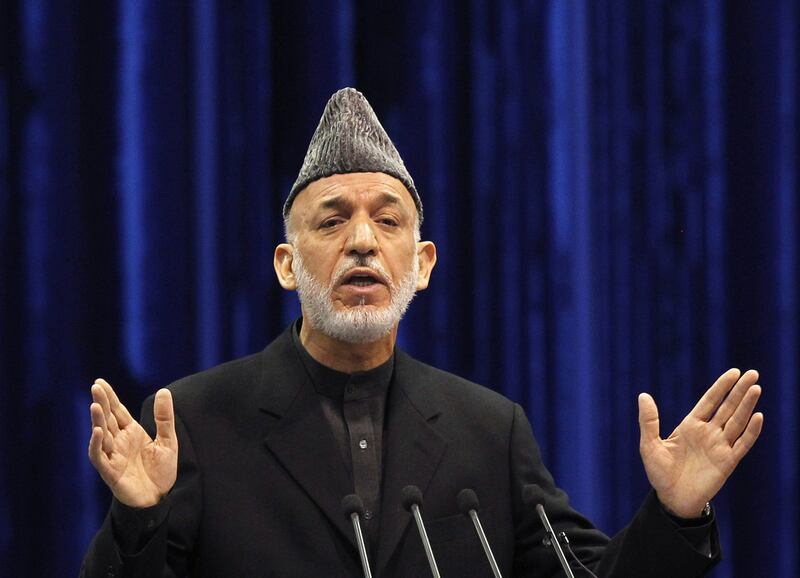KABUL // The Afghan president urged tribal elders yesterday to support a security deal with the United States, but said he would defer the signing of the agreement to the winner of next year’s presidential elections.
Hamid Karzai’s statement came after days of negotiations between Afghan and US negotiators eager to finalise the text before the Loya Jirga, a consultative council of elders and other dignitaries who hold the power to derail the pact.
In a last-minute bid to bolster support, President Barack Obama sent a letter promising that the US will continue to respect “Afghan sovereignty” and promised that the US military will not conduct raids on Afghan homes except under “extraordinary circumstances,” involving urgent risks to US nationals. The statement referred to night raids, which have been a particularly sensitive issue to the Afghans.
Mr Obama also said “we look forward to concluding this agreement promptly” in the letter, which was read by Mr Karzai to the 2,500 member council.
Mr Karzai’s suggestion to push the signing of the Bilateral Security Agreement until after the April 5 elections, which he is not aloud to contest, could be a deal breaker since the US wants an agreement as soon as possible to allow for preparations to maintain a military presence after 2014, when the majority of foreign combat forces will have left Afghanistan. The US had wanted a deal signed by the end of October.
“If you accept it and Parliament passes it, the agreement should be signed when the election is conducted, properly and with dignity,” Mr Karzai said in a speech that lasted more than one hour.
It was unclear if the mercurial Mr Karzai would indeed wait for the elections or sign the agreement if approved by the Loya Jirga and the parliament. He could also be waiting for the Jirga to ask him to sign it.
Mr Karzai has in the past made inflammatory remarks only to then change his mind. He signed a strategic partnership with Mr Obama last year despite criticising the United States for its military actions in Afghanistan, including night raids against Afghan homes and air strikes that resulted in civilian casualties.
His reticence to sign could also be attributed to his awareness that previous leaders of his country historically have been punished if seen as selling out to foreign interests.
The Loya Jirga can revise or reject any clause of the draft agreement, but its decisions are not binding. Then the deal still must be approved by the Afghan parliament, which could ask for more changes.
The Loya Jirga will hold a series of closed-door meetings until Sunday, when it makes its suggestions on the security deal to Mr Karzai.
On the US side, only Mr Obama’s administration needs to approve the agreement, but it could reject changes made by Afghan officials. If it does, that leaves open the option for the US to pull all troops out of Afghanistan. The same could happen if the deal is not signed in a timely manner.
Mr Karzai said the deal would pave the way for 10,000 to 15,000 US troops to stay in the country after the Nato combat mission ends at the end of 2014 and give the United States nine bases around the country that it can use.
US officials have not yet disclosed the number of troops they want to keep in Afghanistan after 2014.
Associated Press





